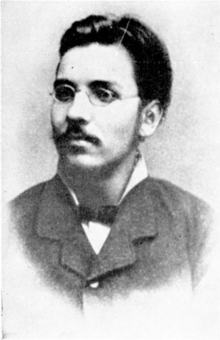The Voynich Manuscript/Wilfrid Michael Voynich

Wilfrid Michael Voynich (Telshi, Russian Empire, 31 October 1865[1] – New York City, United States, 19 March 1930), born Michał Habdank-Wojnicz, was a Polish revolutionary, British and American antiquarian and bibliophile, and the eponym of the Voynich manuscript.
Biography
[edit | edit source]Michał Wojnicz was born in Telshi — a town in then Kovno Governorate, which was part of the Russian Empire, now it is Telšiai, a town in Lithuania — into a Polish-Lithuanian noble family. He was the son of a titular counsellor (described by Prinke as a "petty official").[1]
He studied at the universities in Warsaw and St. Petersberg[2], and graduated from Moscow University in chemistry and pharmacy.
In 1885, in Warsaw, Wojnicz joined Ludwik Waryński's revolutionary organization, Proletarjat. He was vital for the organization as a stranger who spoke fluent Russian, so could gain favour of a renegade Pole, Lieut.-Col. Bielanowski of the gendarmerie, from whom he elicited the passwords for the planned escape of Piotr Bardowski (1846-1886) and Stanisław Kunicki (1861-1886), former members of Narodnaya Volia and both sentenced to death, from the Citadel. The attempt failed allegedly due to a traitor, and Bardowski and Kunicki were hanged on 28 January 1886, while Woynicz and others were arrested by the Tsarist police and, in 1887, he was sent to penal servitude at Tunka[3].
In 1890 he escaped from Siberia and arrived in London, adopting as his first name his nom de guerre, Wilfryd. In 1893 he married a fellow-revolutionary, Ethel Lilian Boole, daughter of the famous British mathematician, George Boole.
With Sergey Stepnyak-Kravchinsky, a fellow revolutionary, he founded the Society of Friends for a Free Russia in London.[4]
After the 1895 death of Stepniak in a railway crossing accident, the Voyniches (as they had anglicized their surname) ceased revolutionary activity. In 1898 Voynich opened a bookshop in London, followed by another in 1914 in New York. He was much involved with the handling of early books and wrote a number of catalogues and other texts on the subject.
Voynich died in New York in 1930.
References
[edit | edit source]- ↑ a b Деятели революционного движения в России: Био-библиографический словарь: От предшественников декабристов до падения царизма: [В 5 т.]. - М.: Изд-во Всесоюзного общества политических каторжан и ссыльно-поселенцев, 1927-1934. Entry on Voynich
- ↑ Otto von Schleinitz, "Die Bibliophilen. W. M. Voynich" in Zeitschrift für Bücherfreunde, 10 (1906/7), p. 481-487
- ↑ E. Millicent Sowerby, Rare People & Rare Books, London 1967 [2nd ed. Williamsburg, Va. 1987]
- ↑ Lewis Bernhardt, "The Gadfly in Ruissia," The Princeton University Library Chronicle 28, no. 1 (Autumn 1966): 2.
External links
[edit | edit source]- Biographical information on E. L. Voynich and W. M. Voynich by Rafał T. Prinke
